South Africa leaders ignore Marikana lessons at their peril
- Published
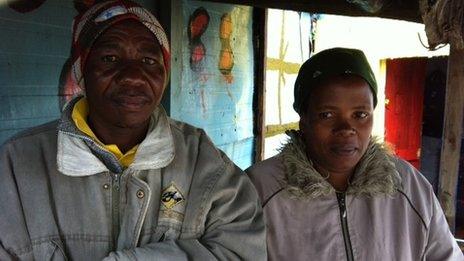
Rock driller Mncedisi Paliso earns around $10 (£6) a day for spending eight hours underground - hardly enough to provide for his wife and their two children
The landscape is airbrushed white and Mncedisi Paliso is clearing hailstones off his roof before they melt. Leave it too long and the water will seep through the holes in the corrugated iron roof, drenching the bed beneath.
An eerie silence haunts South Africa's Marikana mine. A ferocious hailstorm has forced protesters into their homes to contemplate the events of these past few weeks.
"It's a strike about wages," Mr Paliso explains, but it's also about tackling grinding poverty and inequality.
"Wages mean improving our lives… If you've got money, you can build a home and do things like look after your family."
Mr Paliso and his family moved here from the Eastern Cape three years ago.
The village they hail from buried its dead from the "Marikana massacre" just last week.
There was little chance of employment back at home, so work at the vast platinum mine was the next best thing for the Paliso family.
'White capital'
Mr Paliso, a man in his mid 40s, spends eight hours underground each day as a rock driller and, because he is a contract worker, earns less than his colleagues - 2,500 rand ($300; £190) a month - and no living allowance.
He and his wife rely on that income plus a meagre government child grant to feed their two children. Their home is a painted blue "shack farm" with a goat and a couple of dogs outside. And a roof that leaks.
They are under no illusion that the wage increase their union is demanding, (though badly needed) will provide a quick fix to their problems.
"A lot of people say: 'We would rather kill than go back to what we were earning'," Mr Paliso says and he agrees with that, but ultimately he concedes it is a more complex problem.
Observers have salivated at the thought of an "African Arab Spring" emerging from the Marikana dispute. But it's not happening.
Unlike Libya or Syria, the new South Africa has a democratic tradition, and despite widespread frustrations at the slow pace of change, so far the protest action has been largely confined to the mining sector.
But it is still a turning point, according to political analyst Eusebius McKaiser.
"I don't think this has the spark to make it an Arab Spring, but this is the first event in post-apartheid South Africa since 1994 where you can't say there will be zero political fallout for the major factions within the ruling ANC alliance."
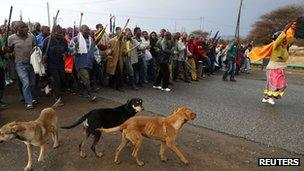
Although frustration is widespread, protests have so far been largely confined to the mining sector
While Julius Malema - the expelled leader of the ANC youth league - has said "white capital" is largely to blame for inequality in South Africa, Mr Paliso's wife Nomnikelo is more circumspect.
She expresses a disappointment with the leaders of the ruling party - a party she once supported without question.
"I think the government is ultimately responsible," she states bluntly.
"They are in charge, they are the ones that should be blamed and I think it is their duty to improve our lives."
But levelling South Africa's economic playing field is an enormous task - the statistics bear this out.
According to the World Bank, the richest 10% of the population earns 58% of national income while those at the bottom, the poorest 50%, earn just 8%.
Apartheid's cruel legacy is still being blamed up to a point, but so too are the elites that have shaped the new South Africa.
"One of the most horrible things is that we are one of the most unequal societies in the Milky Way," argues Mr McKaiser.
"Government has never really dealt with this. We've always hoped that it would deal with economic growth challenges, joblessness and poverty, and that inequalities would somehow fall into place as a consequence. What we are now seeing is a political challenge that comes with the injustice."
Leadership failure
The trade unions once carried the moral high ground to address the injustices of apartheid, but many have now been criticised for being "too close" to government and big business.
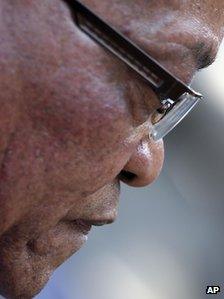
President Jacob Zuma has been accused of failing to show the political courage
This blocks the possibility of shaking up South Africa's labour laws to encourage businesses to flourish.
President Jacob Zuma has been accused by all sides for failing to show the political courage to deal with this sensitive issue and for protecting vested interests within his own party.
Meanwhile, figures like Mr Malema have a ready market in the disillusioned poor, who are ready to seize upon his every word. Nationalisation - his mantra - is the solution to South Africa's inequality problems.
So where is the responsibility of the mine owners in all this? Shouldn't Lonmin, which is listed on both the Johannesburg and London Stock Exchanges, have seen this coming, given that workers' appalling conditions have persisted for years?
Lonmin executive Abey Kgotle says:
"People have chosen to use means that are out of the ordinary when it comes to collective bargaining. We have the Labour Relations Act but clearly people have acted outside that scope."
The phrase that keeps coming up time and time again during commentary on the Marikana dispute, is leadership.
Failure of leadership within business, within the trade unions and within a governing party that is trying to straddle both the political left and right.
Collectively many argue, they have failed to address South Africa's very pressing problems of inequality.
The miners may not be at the "bottom of the pile" in terms of pay, as many commentators have pointed out, but with 36% of South Africans having no job whatsoever or unions to argue their case, leaders ignore inequalities at their peril.
- Published3 September 2012
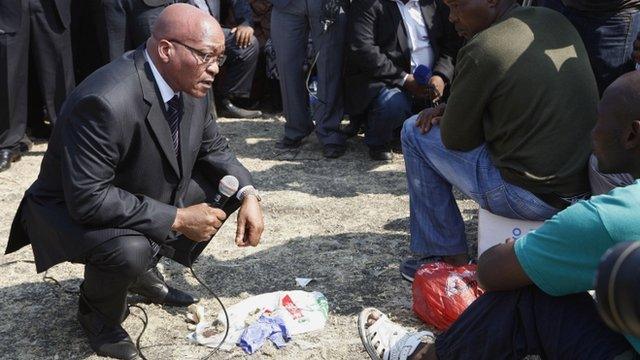
- Published29 August 2012
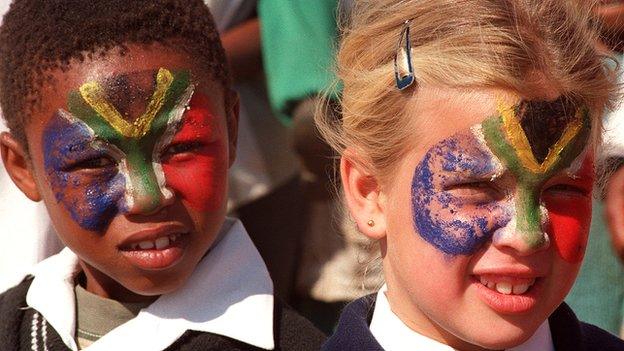
- Published24 August 2012
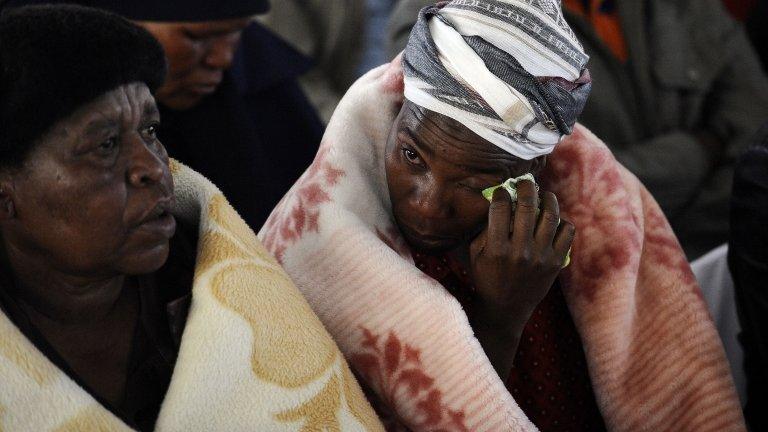
- Published23 August 2012
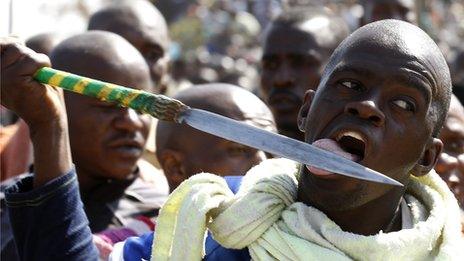
- Published8 May 2024
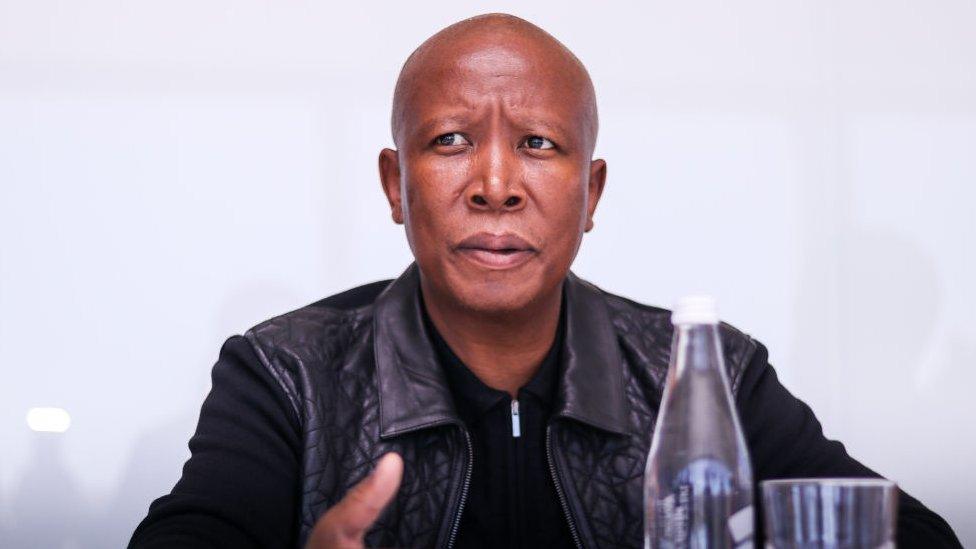
- Published19 December 2022